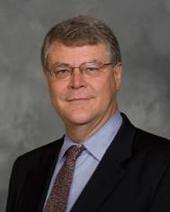
This post was first published on ASCO Connection, July 1, 2016. ASCOConnection.org is the professional networking site for the American Society of Clinical Oncology (ASCO) and the companion website for ASCO’s official member magazine, ASCO Connection. Dr. Randy Hillard is a Professor of Psychiatry at Michigan State University and was diagnosed with metastatic gastric adenocarcinoma in 2010.
I have nothing at all against National Cancer Survivors Day. In fact, I love it! Not so long ago, cancer survivors were generally pitied, rather than celebrated. National Cancer Survivors Day is a day of celebration, unlike my other “cancerversaries,” such as the day I first noticed symptoms, the day I was diagnosed, the day I had my stomach removed, or the day I started chemotherapy. Those other days feel to me like days of loss, although I keep telling myself that they should feel some other way.
However, in spite of the celebration, I really do feel guilt while being celebrated. There is the survivor guilt. Why am I surviving while lots of wonderful people have died of the same disease? They had every bit as much right to survival as I did, maybe more.
There is another source of guilt, though. Why are we, the survivors, being honored, rather than those who have kept us alive and who have given us something to live for, even in our darkest hours?
My wife, Aingeal, once said to me, “This is probably as hard for me as it is for you.” Was I sympathetic? No, I was angry. Her life expectancy in years was about the same as my life expectancy in months. How could anyone in her right mind think that this is as hard for her as it is for me? Of course, one of the reasons that things may have been even harder for her at times than for me was that she had to be dealing with me the whole time. No one is easy to deal with when acutely ill, especially when acutely ill with a frightening illness. Not only do we require a lot of physical and psychological caregiving, but we are a real pain to live with a lot of the time. We have often gone from being independent and seeing lots of people to being dependent and seeing pretty much only our caregiver. We, perhaps especially us men, feel diminished by being dependent and isolated, and that makes us angry. And who would you expect us to take out our irrational anger on?
If we complain about our caregiver, everybody will be sympathetic towards us and probably critical of our caregivers. If our caregivers complain about us, everybody is directly or indirectly critical of them and is likely to say something totally unhelpful like, “You have to be strong for him.” We get to express all of our negative feelings if we want to, but usually our caregivers do not feel that they are “allowed” to express their feelings. Few things are as subtly depressing as trying to act optimistic all the time regardless of one’s actual feelings.
We survivors get lots of sympathy, while our caregivers get taken for granted, much of the time even by us.  That is why a day celebrating cancer caregivers seems to me to be even more important than a day celebrating cancer survivors.
That is why a day celebrating cancer caregivers seems to me to be even more important than a day celebrating cancer survivors.
I realize that not everyone likes the word “caregiver.” First of all, “caregiver” and “caretaker” are more or less synonyms, although it seems like they ought to be antonyms. (This probably does not bother other people as much as it does me. I am also bothered by “flammable” versus “inflammable.”) Clearly the connotations of “giving care to” someone are more positive than the connotations of “taking care of” someone. Still, though, the term implies that the survivor needs to be “cared for.” As I mentioned above, that does not make any of us feel good, and it may even make us feel powerless and angry. “Lovegiver” might be a better term, because even when we cannot admit that we need to be taken care of, we can always acknowledge that we need to be loved in order for life to be worth living. On the other hand, “lovegiver” might have some problematic connotations, as well.
Another potential problem with the term caregiver is that there is already a National Family Caregivers Month (November) and Day (November 1). We should all celebrate the caregivers of anyone who needs care, but I think that cancer caregivers need a day of their own. After all, we do not just have a “Family Survivors Day” celebrating everybody who has survived anything. Maybe National Cancer Caregivers Day could be celebrated in November since the set of cancer caregivers is a subset of the set of family caregivers.
I sort of like the term “co-survivor,” and I would not object to have a “National Cancer Co-Survivors Day”. Maybe “National Cancer Survivors and Co-Survivors Day” might be okay, although I would like to see those who care for us have their own day. If survivors and caregivers shared the same day, then we, the survivors, would probably still get most of the attention, which would be defeating the purpose. One way or another, we need to publicly honor those who have shouldered the often thankless burden of our care and who have managed to care for us with kindness and warmth and selflessness.
I am serious about this proposal. Let’s make “National Cancer Caregivers Day”, or whatever we choose to call it, a reality. One day a year is by no means as much recognition as our unsung heroes deserve, but it is a start.
